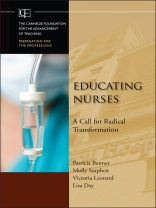The authors outline a clear vision of what nursing education can and should be and provide practical exemplars of how we can achieve this vision. This is a call for us to work together as guardians of the discipline to assure that future nurses enter the health care system ready and able to meet the challenges ahead.
— PAMELA M. IRONSIDE, director, Center for Research in Nursing Education, Indiana University
The profession of nursing in the United States is at a significant moment. Since the last national nursing education study almost forty years ago, profound changes in science, technology, and the nature and settings of nursing practice have reshaped the field. Yet schools have lagged behind in adapting to these changes. Added to this, the profession faces a shortage of nurses and nursing faculty.
To meet these challenges, the authors assert that schools, service providers, and the profession must change. They recommend four controversial yet essential changes that are needed to transform nursing education.
A volume in The Carnegie Foundation for the Advancement of Teaching’s -Preparation for the Professions series, the book discusses key topics for the future of the field and offers revolutionary recommendations for change.
İçerik tablosu
Foreword ix
Acknowledgments xv
The Authors xix
Introduction 1
PART ONE Transformation, Crisis, and Opportunity 17
1. A Profession Transformed 19
2. Teaching and Learning in Clinical Situations 41
3. Teaching and Learning in the Classroom and Skills Lab 63
4. A New Approach to Nursing Education 81
PART TWO Teaching for a Sense of Salience 93
5. Paradigm Case: Diane Pestolesi, Practitioner and Teacher 97
6. Strategies for Teaching for a Sense of Salience 109
PART THREE Integrative Teaching for Clinical Imagination 127
7. Paradigm Case: Lisa Day, Classroom and Clinical Instructor 131
8. Developing a Clinical Imagination 143
9. Connecting Classroom and Clinical Through Integrative Teaching and Learning 155
PART FOUR Teaching for Moral Imagination 165
10. Paradigm Case: Sarah Shannon, Nurse Ethicist 169
11. Being a Nurse 177
12. Formation from a Critical Stance 201
PART FIVE A Call for Radical Transformation 211
13. Improving Nursing Education at the Program Level 215
Appendix: Methods for the Carnegie National Nursing Education Study 231
References 239
Index 249
Yazar hakkında
PATRICIA BENNER directs The Carnegie Foundation for the Advancement of Teaching’s Study of Nursing Education and is professor emerita at the University of California, San Francisco School of Nursing. She is a nursing educator and author of From Novice to Expert: Excellence and Power in Nursing Practice and other notable books on nursing practice and education.
MOLLY SUTPHEN is on the faculty at the University of California, San Francisco and codirector of The Carnegie Foundation’s Study of Nursing Education. She is a historian who has published widely on nursing education and the history of -international health.
VICTORIA LEONARD is a former nurse educator in maternal child nursing and health policy. Currently, she is a family nurse practitioner and child care health consultant at the UCSF California Childcare Health Program.
LISA DAY is a former nurse educator in critical care, acute care nursing, and ethics. -Currently, she is a clinical nurse specialist for neuroscience and critical care at UCSF Medical Center. She authors the ethics column for the American Journal of Critical Care.












